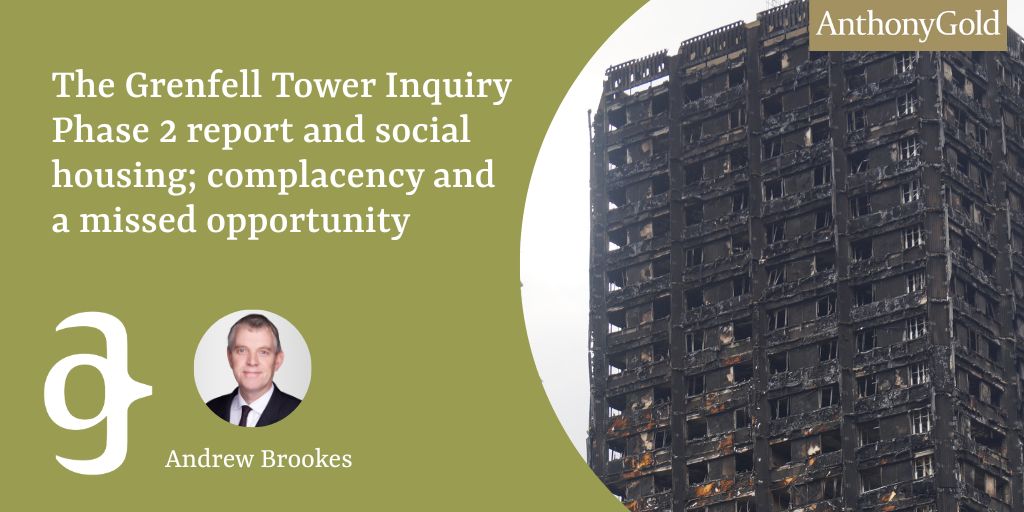The Grenfell Tower inquiry phase 2 report and social housing; complacency and a missed opportunity.


The Grenfell Tower Phase 2 report was published on 4 September. Despite searing criticism of the organisations that owned and managed the Tower, the Inquiry has missed an opportunity to recommend further reforms to the social housing sector.
The Inquiry found that the organisation that managed the Tower, the Tenant Management Organisation (“TMO”), learnt nothing from two independent reports which criticised it in the years before the fire. The Inquiry found that relations between the TMO and many residents were characterised by distrust, dislike, personal antagonism and anger. The TMO failed to take resident concerns seriously. It did not treat residents with understanding and respect.
The failure to listen to and properly communicate with residents had a real impact on the safety of the Tower. To take one example, between 2010 and 2016 there was no fully functioning smoke ventilation system in the Tower. In March 2014 the London Fire Brigade issued a deficiency notice to the TMO because of its failure to maintain the smoke ventilation system. The Leaseholders’ Association, chaired by a resident and our client, Shah Ahmed, complained about the state of the smoke ventilation system from 2010 onwards. Rather than engage with the Leaseholders’ Association’s legitimate concerns, the Inquiry found that the Association was ignored, fobbed-off and misled. The defects were wrongly described as minor. A vital engineer’s report on the smoke ventilation system was withheld, as was the existence of the deficiency notice. The Leaseholders’ Association was not given a full and accurate picture.
This and other examples in the Inquiry report could and should have led the Inquiry to recommend changes to the law so that residents and residents’ organisations have enhanced rights to be formally recognised, properly consulted and given extra rights to information. Instead, the Inquiry pointed to the existing Social Housing (Regulation) Act 2023 and concluded that the powers given to the Regulator of Social Housing were sufficient, so that no further recommendations were required. This is a missed opportunity. While the new powers handed to the Regulator are helpful, that does not give individual residents and resident groups powers they need to themselves hold landlords to account. By implementing relatively minor and straightforward changes, the government could make buildings safer by empowering the real experts, the residents who live in them. We at Anthony Gold will continue to support occupiers of social housing in their push for change.
Please note
The information on the Anthony Gold website is for general information only and reflects the position at the date of publication. It does not constitute legal advice and should not be treated as such. It is provided without any representations or warranties, expressed or implied.

Our Latest Insights
Latest Articles
View allGuide: October 29, 2025
Guide: October 27, 2025
Contact the Conveyancing team today
Contact us today
"*" indicates required fields
Contact the commercial
& civil Dispute team today
"*" indicates required fields
Contact the Conveyancing team today
Contact the Conveyancing team today
Contact the Wills, Trusts
& Estates team today
Contact the Court of
Protection team today
Contact the Employment Law team today
Contact the Clinical Negligence team today
Contact the Family & Relationships team today
Contact the Personal Injury Claims team today
Contact the leasehold & Freehold team today
Contact the Corporate & Commercial team today
Contact the housing & disputes team
"*" indicates required fields













